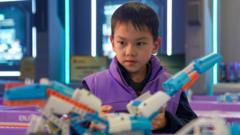As economic challenges and societal pressures mount in China, many young individuals are finding solace in DeepSeek, an AI application offering unique therapeutic guidance. Users share poignant experiences of connection, countering the emotional difficulties exacerbated by the ongoing uncertainty in their lives.
Young Chinese Turn to AI for Emotional Healing Amidst Uncertainty

Young Chinese Turn to AI for Emotional Healing Amidst Uncertainty
With the rise of DeepSeek, a groundbreaking AI chatbot, Chinese youth are discovering a source of comfort and emotional support during turbulent times.
The advent of AI technologies has sparked a significant shift in how young people in China approach emotional well-being, as evidenced by the phenomenon surrounding DeepSeek. This innovative AI application has become a refuge for many, including 28-year-old Holly Wang, who utilizes it for "therapy sessions" in the evenings. Since its launch in January, DeepSeek has allowed users to share their grief and challenges, providing responses so impactful they have brought some users to tears.
As Holly reflects on her interactions with the chatbot, she notes a transformative experience, especially following the loss of her grandmother. DeepSeek not only offered her solace but also helped her gain insights into her emotions, far surpassing her previous experiences with paid counseling services. "It has helped me look at things from different perspectives," Holly shares, emphasizing a deep sense of connection with the AI.
In China, where the discourse around mental health remains heavily stigmatized, DeepSeek has emerged as a beacon of hope. The app, modeled after other prominent AI tools like ChatGPT, boasts an advanced generative AI capability, making it particularly adept at understanding and responding to users' emotional needs. This feature resonates deeply with young people who often feel unheard in their personal lives.
Despite facing economic stagnation, high unemployment rates, and the restrictive aftermath of COVID-19 lockdowns, young individuals like Holly can find comfort through AI, filling a vacuum where traditional mental health services fall short. The nation's increasing struggle with anxiety and depression highlights the potential of AI assistance in addressing mental health concerns.
Experts, including Nan Jia of the University of Southern California, affirm the app’s unique ability to emotionally engage users: "AI appears to be better able to empathize than human experts also because they 'hear' everything we share." This sentiment is echoed in personal accounts of users who describe the empathetic and understanding responses delivered by the app.
While competing Western apps remain inaccessible due to censorship policies in China, the success of DeepSeek has set it apart from other local alternatives, which many users describe as underwhelming. With its ability to generate creative and emotionally resonant content, DeepSeek presents a fresh approach to addressing emotional concerns for the youth.
However, concerns about privacy and censorship persist, especially as the Chinese government exerts control over digital platforms. Though many users express satisfaction with the app’s support, they remain wary of the potential consequences of discussing politically sensitive topics. This dichotomy between seeking comfort and navigating censorship underlines the complex relationship young people have with technology in China's landscape.
Despite these challenges, the remarkable rise of DeepSeek points to a future where AI could play a pivotal role in offering emotional support. As young Chinese continue to encounter uncertainties in an evolving socio-economic environment, AI may prove to be a crucial ally in their quest for understanding and solace.




















